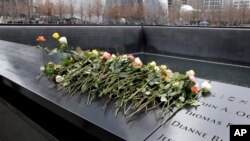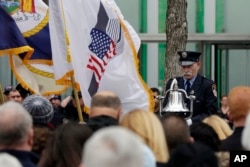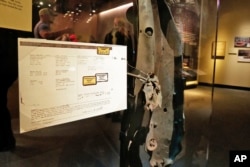The World Trade Center's operators apologized Monday to relatives of people killed in the 1993 bombing there, saying the country was unprepared for a terror attack that foreshadowed 9/11. The families urged people to understand its legacy.
Victims' families, survivors, first responders and others marked the bombing's 25th anniversary on what is now the Sept. 11 memorial plaza. They observed a silent moment, read victims' names, laid roses on the memorial and reflected on an explosion that became a telling signal of terrorists' aims.
Watch: 25 Years Later: New York Commemorates 1993 WTC Bombing
"We were not ready for what visited us that day. Americans were not ready for what visited them that day," said Kevin O'Toole, chairman of the Port Authority of New York and New Jersey, which runs the trade center. "And for that, I say: I'm sorry. And we are sorry."
The blast in an underground parking garage on Feb. 26, 1993, killed six people, one of them pregnant. It injured more than 1,000 and forced an estimated 50,000 to flee the trade center's twin towers in a scene of smoke, fear and confusion that would be mirrored and magnified on Sept. 11, 2001.
For families of the bombing victims, " '93 is as big as 9/11," said Pat Rodriguez, who lost his pregnant sister, Monica Rodriguez Smith. "It's a place in history that you shouldn't forget."
The anniversary ceremony and a memorial Mass at a nearby church have been held year after year, but the quarter-century mark brought renewed attention. It's "long overdue" to Judy Shirtz, sister-in-law of victim Stephen Knapp. She feels the loss of families like hers has largely been forgotten amid the far greater toll of 9/11.
"It happened to us first, it shouldn't have happened again, and it did," she said.
Muslim extremists set off the bomb in an effort to punish the U.S. for its Middle East policies, according to federal prosecutors. The suspects weren't directly connected to 9/11, but convicted bombing ringleader Ramzi Yousef is a nephew of self-proclaimed 9/11 mastermind Khalid Sheikh Mohammed. And another man convicted in the plot vowed that "the World Trade Center will continue to be one of our targets" in a letter later found on his laptop.
Six bombing suspects were convicted and are in prison. A seventh remains at large.
"People can't forget that the '93 bombing was the powder keg of 9/11," said Andrew Colabella, a cousin of victim John DiGiovanni and also a city councilman in Westport, Connecticut.
Stephen Knapp Jr. also feels it's important for people to keep the '93 bombing in mind — because "you can't let your guard down."
At least 100 people, including former New York Mayor David Dinkins, attended Monday's commemoration by one of the memorial waterfall pools where the names of the bombing victims — DiGiovanni, Knapp, Smith, Robert Kirkpatrick, William Macko and Wilfredo Mercado — are inscribed along with those of the nearly 3,000 killed on 9/11.
There was once a memorial fountain for the bombing, but the fountain was crushed on 9/11. A piece of the fountain is among artifacts in the Sept. 11 museum, where a room is devoted to discussing the '93 explosion.
The blast knocked out power and severed pipes, flooding backup generators, stranding people in elevators and on an observation deck. Thousands of people fled by groping their way down blacked-out, smoky stairs. Some others were plucked from rooftops by police helicopters.
After the bombing, the government-run trade center banned underground parking, put battery-powered lights and reflective paint in stairwells, required ID cards for workers to get into the buildings and added security cameras and vehicle barriers around the site. Companies with offices in the building stepped up fire drills and other preparations.
"For those of us who survived both 1993 and 9/11, I think 1993 happening saved a lot of lives," Lolita Jackson, then a finance worker in the south tower, said in an interview this month. "We knew how to evacuate differently."



